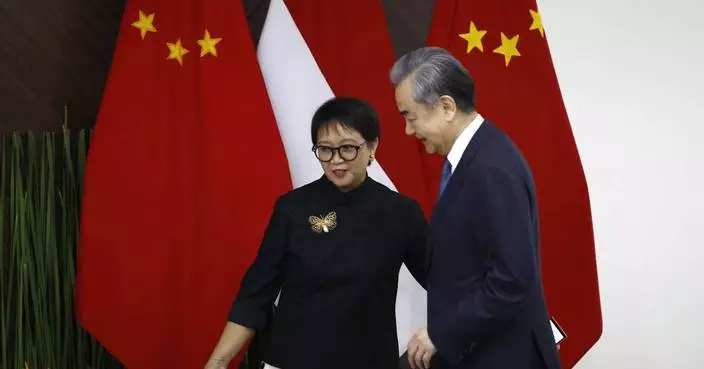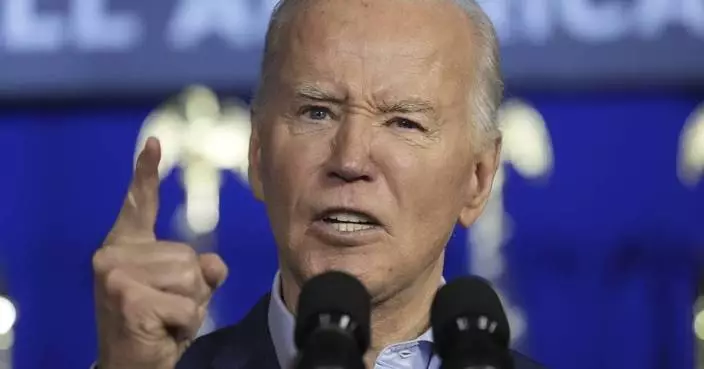China sentenced a Taiwanese activist to five years in prison Tuesday for holding online political lectures and helping the families of jailed dissidents in a conviction demonstrating how Beijing's harshest crackdown on human rights in decades has extended beyond the Chinese mainland.
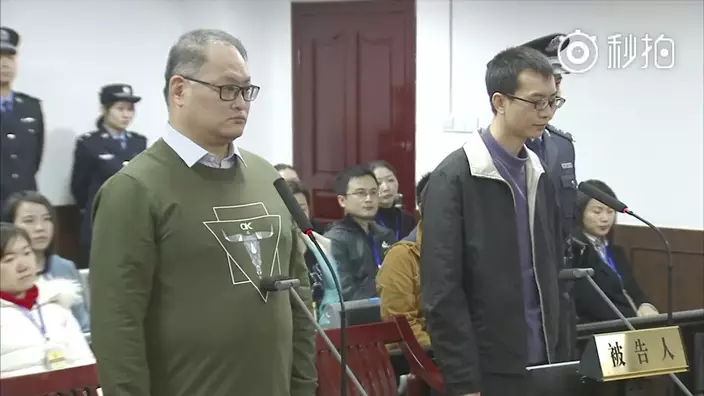
In this image taken from video released on Nov. 28, 2017, by the Intermediate People's Court of Yueyang, Taiwanese activist Lee Ming-che, left, and his fellow defendant Peng Yuhua of China stand during a court session at the Intermediate People's Court of Yueyang in Yueyang in central China's Hunan Province, Tuesday, Nov. 28, 2017. (Intermediate People's Court of Yueyang via AP Video)
The trial of Lee Ming-che was also China's first known criminal prosecution of a nonprofit group worker since Beijing passed a law last year tightening controls over foreign nongovernmental organizations.
The Yueyang City Intermediate People's Court in central China handed down the sentence against Lee after finding him guilty of subversion of state power. Lee had confessed during his trial in September, which his wife, Lee Ching-yu, dismissed as "a political show."
Lee's co-defendant, Peng Yuhua, who is from mainland China, was sentenced to seven years in prison. Peng had also pleaded guilty, saying he had founded an organization called Palm Flower Co. to pressure China to accept a multiparty political system and that Lee was his deputy in charge of education.
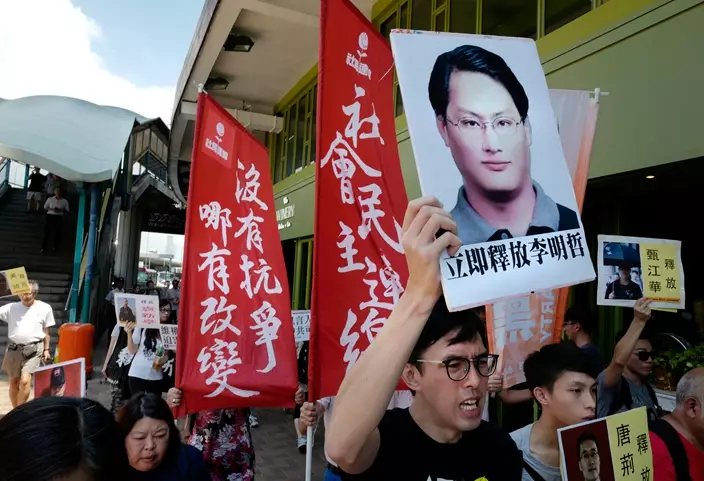
FILE - In this Sept. 11, 2017, file photo, a protester raises a picture of Taiwanese activist Lee Ming-che during a demonstration outside the Chinese liaison office in Hong Kong. A Chinese court on Tuesday, Nov. 28, 2017, has sentenced to five years in prison the Taiwanese activist who conducted online lectures on Taiwan's democratization and managed a fund for families of political prisoners in China. (AP Photo/Vincent Yu, File)
Lee's wife attended the sentencing. "A price must be paid in the pursuit of an ideal," she said in a statement issued through her supporters. "Striving for human rights for the underprivileged is a necessary dedication to promoting the progress of human civilization."
Supporters say that since the trial ended, Lee Ching-yu has been prevented from leaving her hotel room or meeting with anyone. Calls to her cellphone rang unanswered.
"Lee Ming-che took the risk despite knowing the dangers," she said, adding that she was proud of him.
Subversion of state power is a vaguely defined charge often used by Chinese authorities to muzzle dissent and imprison critics. Both men said they would not appeal.
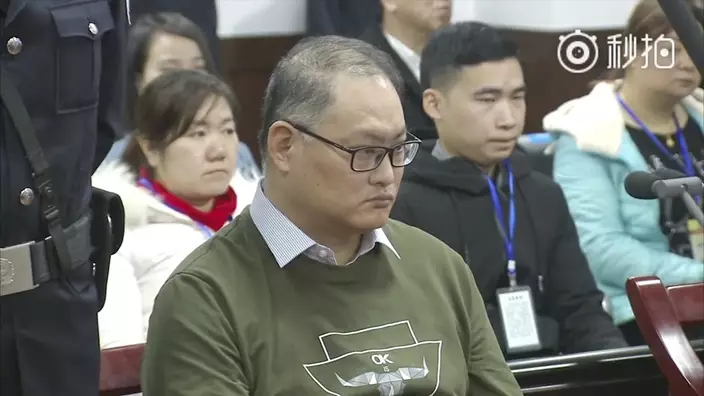
In this image taken from video released on Nov. 28, 2017, by the Intermediate People's Court of Yueyang, Taiwanese activist Lee Ming-che sits during a court session at the Intermediate People's Court of Yueyang in Yueyang in central China's Hunan Province, Tuesday, Nov. 28, 2017. (Intermediate People's Court of Yueyang via AP Video)
Taiwan, a self-governing island Beijing regards as part of Chinese territory, swiftly condemned the sentence.
"The spread of democratic ideas is innocent!" Alex Huang, the spokesman for Taiwanese President Tsai Ing-wen, said in a statement. Huang urged Beijing to release Lee as soon as possible and allow him to return to Taiwan.
"We cannot accept that Lee Ming-che has been convicted of 'state subversion' for sharing ideas of freedom and democracy out of concern for the development of mainland China's civil society and democracy," the statement said.
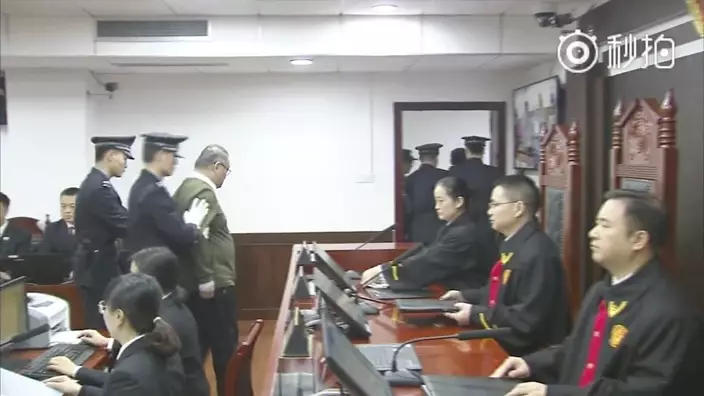
In this image taken from video released on Nov. 28, 2017 by the Intermediate People's Court of Yueyang, Taiwanese activist Lee Ming-che is escorted out after a court session at the Intermediate People's Court of Yueyang in Yueyang in central China's Hunan Province, Tuesday, Nov. 28, 2017. (Intermediate People's Court of Yueyang via AP Video)
Taiwan's Cabinet-level Mainland Affairs Council said in a statement that it would not accept the verdict and that the government would continue working to secure Lee's release from China.
Lee Ming-che, 42, cleared immigration in the semi-autonomous Chinese territory of Macau on March 19 and never showed up for a planned meeting later that day with a friend in the mainland Chinese city of Zhuhai.
He had previously conducted online lectures on Taiwan's democratization and managed a fund for families of political prisoners in China.
Lee's sentence was "incredibly harsh," given the accusations against him and the lack of evidence, said Maya Wang, Human Rights Watch's Hong Kong-based researcher.
"It's probably designed as a warning to activists based outside China, particularly those in Hong Kong and Taiwan," as Chinese President Xi Jinping's crackdown on dissent radiates beyond its borders, Wang said in an email.
In Taiwan, Lee's sentence was met with condemnation and worries about China's cross-border reach.
"This tells all Taiwanese people that this is China's threat. This is also a threat from China to all NGO workers in the world," said Cheng Hsiu-chuan, principal of Taipei Wenshan Community College, where Lee worked as an administrator.
"China is warning us that even if you are not within Chinese territory, it can incriminate you if you go to China," Cheng said.
Lisa Lin, a 20-year-old university student, said the case displays the contrast between China's repressive system and Taiwan's democratic freedoms.
"I think this is not very good because everyone should have the right to express their opinions," Lin said.
China's wide-ranging crackdown on civil society has featured a string of televised "confessions" — believed to have been coerced — from human rights activists accused of plotting to overthrow the political system.
The new law passed in April 2016 says foreign nongovernmental organizations must not endanger China's national security and ethnic unity, and places nonprofit groups under close police supervision. It is seen as an attempt to clamp down on perceived threats to the ruling Communist Party's control.
Relations between Taiwan and China have been near an all-time low since the election of Tsai, whose party has advocated Taiwan's formal independence. China cut off contacts with Taiwan's government in June of last year, five months after Tsai was elected.
WASHINGTON (AP) — House congressional leaders were toiling Thursday on a delicate, bipartisan push toward weekend votes to approve a $95 billion package of foreign aid for Ukraine, Israel and Taiwan, as well as several other national security policies at a critical moment at home and abroad.
Republican House Speaker Mike Johnson this week set in motion a plan to advance the package, which has been held up since October by GOP lawmakers resistant to approving more funding for Ukraine's fight against Russia. As the Republican speaker faced an outright rebellion from his right flank and growing threats for his ouster, it became clear that House Democrat Leader Hakeem Jeffries would have to lend help to Johnson every step of the way.
“This is a very important message we are going to send to the world this week, and I'm anxious to get it done,” Johnson said earlier Wednesday announcing his strategy.
The growing momentum for a bipartisanship dynamic, a rarity in the deeply divided Congress, brought rare scenes of Republicans and Democrats working together to assert U.S. standing on the global stage and help American allies. But it also sent Johnson's House Republican majority into fresh rounds of chaos.
Johnson's Republican leadership team, seizing on the opportunity to outflank hardline conservatives with Democratic support, raised the idea of quickly changing the procedural rules to make it harder to oust the speaker from office.
But ultra-conservatives reacted with fury, angrily confronting Johnson on the House floor in a tense scene on Thursday morning. Several suggested they would join the effort to oust Johnson if the rule was changed. By the afternoon, Johnson backed away from the idea.
“We will continue to govern under the existing rules,” the speaker said on the social platform X.
Meanwhile, a rare image of bipartisan statesmanship was on display as the procedural Rules committee began debate launching the steps needed to push the foreign aid package forward toward weekend voting.
The Republican chairmen of the powerful Appropriations and Foreign Affairs committees alongside their top Democratic counterparts spoke in evocative language, some drawing on World War II history, to make the case for ensuring the U.S. stand with its allies against aggressors.
Chairman Michael McCaul of the Foreign Affairs Committee cast this as a “pivotal” time in world history, comparing the current images of people fleeing the conflict in Europe to the situation in 1939 as Hitler's Germany rose to power.
“Time is not on our side,” he told the panel.
The top Democrat on the Foreign Affairs Committee, Rep. Greg Meeks of New York, shared McCaul’s urgency: “The camera of history is rolling.”
Johnson is trying to advance a complex plan to hold individual votes this weekend on the funds for Ukraine, Israel and allies in the Asia-Pacific, then stitch the package back together.
The package would also include legislation that allows the U.S. to seize frozen Russian central bank assets to rebuild Ukraine; impose sanctions on Iran, Russia, China and criminal organizations that traffic fentanyl; and potentially ban the video app TikTok if its China-based owner doesn’t sell its stake within a year.
President Joe Biden is emphatically pushing Congress to pass the legislation to buttress what has been a cornerstone of his foreign policy — halting Russian President Vladimir Putin’s advance in Europe.
“With the boost from supplemental assistance, Ukrainians are entirely capable of holding their own through 2024, and puncturing Putin’s arrogant view that time is on his side,” CIA Director Bill Burns told an audience at the Bush Center in Dallas Thursday.
While Johnson is trying to remain close to Trump, and positioning the national security package as a way to assert U.S. strength in the world in the mold of Ronald Reagan-era Republicans, that puts the speaker politically at odds with the anti-interventionists powering the former president's bid to return to the White House.
“Why isn’t Europe giving more money to help Ukraine?” Trump wrote on social media, but his post did not explicitly oppose the foreign aid package before Congress.
At the Capitol, the ultraconservative House Freedom Caucus was urging Republicans to block the package from advancing to a final vote. The group demanded that sweeping immigration enforcement be added to the bill and derided it as the “‘America Last’ foreign wars supplemental package.”
Given the high stakes of the moment for Ukraine, Israel and other allies, and the inability of Johnson to marshal enough Republican support, the speaker had no other choice but to rely on Democrats if he intends to see the national security package to passage.
Late Thursday night, the four Democrats on the Rules committee voted for a procedural move to advance the bill to the House floor, while three archconservative Republicans voted against it.
Rarely, if ever, does the minority party help the majority through the procedural hoops, particularly in the House Rules committee or during the various floor votes before final passage. It represented a level of bipartisanship unseen in this Congress, even as Republican leaders watched their own priority bills defeated on procedural votes by their own members.
“This is a moment in history where we need to ensure that at long last we are bringing this critical aid to Ukraine to the floor,” Democratic Whip Rep. Katherine Clark told reporters earlier Thursday.
Yet Democrats were also trying to apply maximum leverage as Johnson's job comes under threat.
At a closed door Democratic meeting, Clark advised rank and file lawmakers not to divulge their positions on whether they would vote to help defeat a motion to vacate Johnson as speaker, though a handful of Democrats have already publicly said they would likely do so.
“Do not box yourself in with a public statement," Clark told them according to a person familiar with the remarks.
Lawmakers say the world is watching and waiting on its next steps, but there's still a long slog ahead. If the House is able to clear the package this weekend, it still must go to the Senate for another round of voting.
Sen. Rand Paul, a Republican of Kentucky who is adamantly opposed to the aid package, said on X that “no one should expect easy or quick passage in the Senate.”
Associated Press writer Ellen Knickmeyer in Washington contributed.
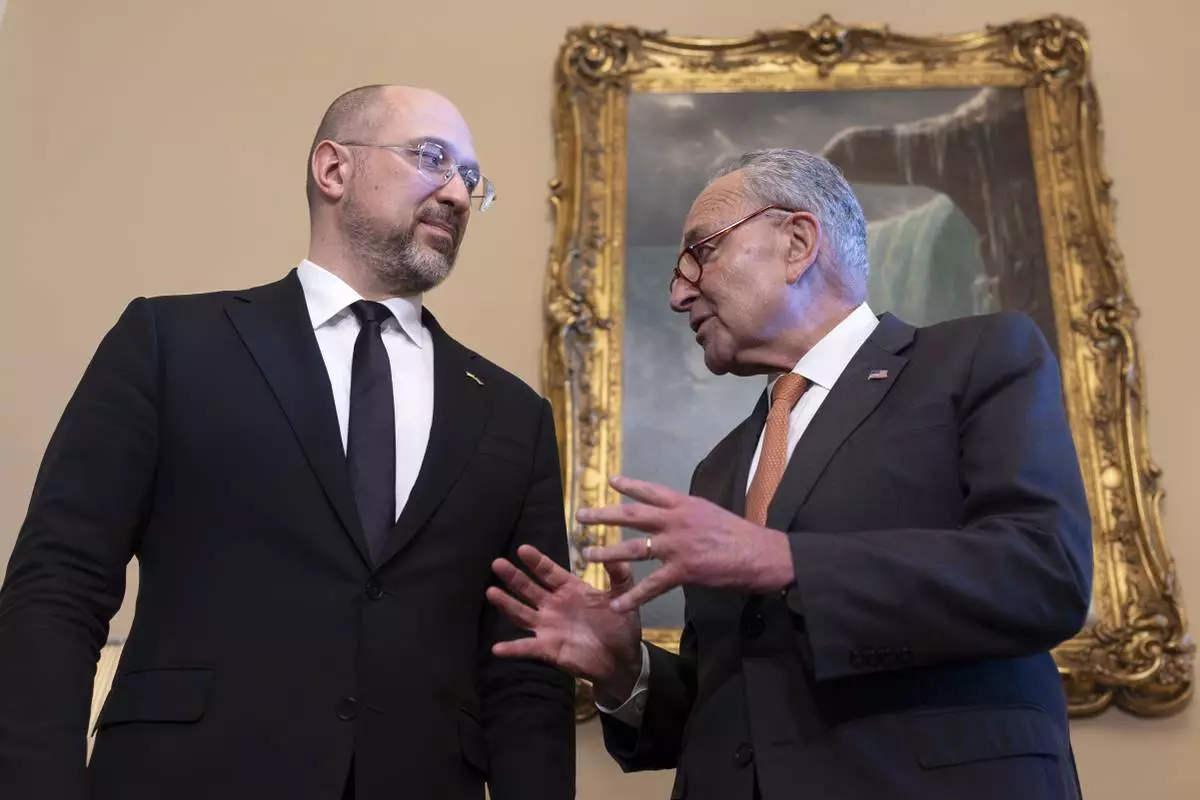
Ukraine's Prime Minister Denys Shmyhal, left, is welcomed by Senate Majority Leader Chuck Schumer, D-N.Y., as Congress moves to advance an emergency aid package for Israel, Ukraine and Taiwan, at the Capitol in Washington, Thursday, April 18, 2024. (AP Photo/J. Scott Applewhite)
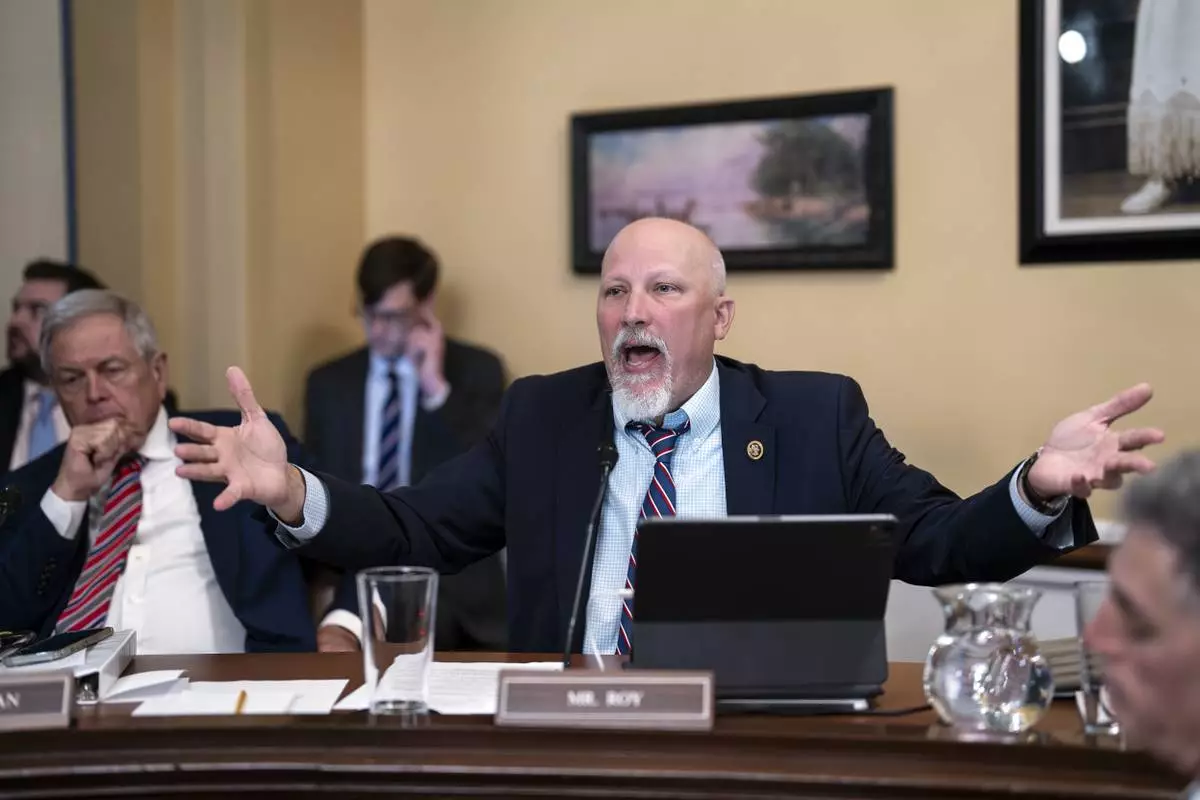
Rep. Chip Roy, R-Texas, joined at left by Rep. Ralph Norman, R-S.C., argues a point as the House Rules Committee prepares an emergency foreign aid package for Israel, Ukraine and Taiwan, at the U.S. Capitol in Washington, Thursday, April 18, 2024. (AP Photo/J. Scott Applewhite)

House Appropriations Chairman Tom Cole, R-Okla., appears before the House Rules Committee as they prepare an emergency foreign aid package for Israel, Ukraine and Taiwan, at the U.S. Capitol in Washington, Thursday, April 18, 2024. (AP Photo/J. Scott Applewhite)

Speaker of the House Mike Johnson, R-La., and the House Republican leadership meet with reporters following a closed-door Republican strategy session as Johnson pushes towards separate votes on aid for Israel and Ukraine, at the Capitol in Washington, Tuesday, April 16, 2024. (AP Photo/J. Scott Applewhite)











